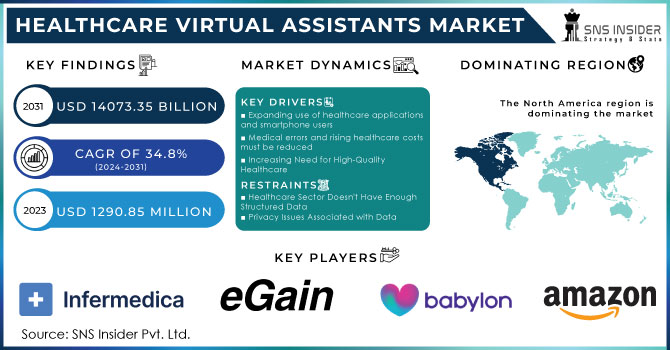The global Healthcare Virtual Assistants market size projected to surge from USD 1,290.85 million in 2023 to a staggering USD 14,073.35 billion by 2031. This phenomenal expansion, representing a compound annual growth rate (CAGR) of 34.8% over the forecast period from 2024 to 2031, highlights the transformative potential of virtual assistant technologies in the healthcare sector.
The rapid growth of the market is attributed to several key factors, including technological advancements in AI and machine learning, increasing demand for healthcare automation, and the rising prevalence of chronic diseases necessitating efficient patient management. Healthcare virtual assistants are revolutionizing patient care by providing timely assistance, improving patient engagement, and enhancing operational efficiencies in healthcare facilities.
Revolutionizing Healthcare with Virtual Assistants
Healthcare virtual assistants, powered by AI and natural language processing (NLP), offer a wide range of services from scheduling appointments to providing medication reminders and offering personalized health information. These virtual assistants are designed to improve patient experience and streamline administrative tasks, allowing healthcare professionals to focus more on patient care.
Virtual assistants can answer patient queries, provide health tips, and offer support for chronic disease management. They also play a critical role in telemedicine, enabling remote consultations and monitoring, thereby expanding access to healthcare services, especially in remote and underserved areas.
Get a Free Sample Report : https://www.snsinsider.com/sample-request/2086
Market Dynamics and Key Drivers
The impressive growth of the Healthcare Virtual Assistants market is driven by several dynamic factors:
- Technological Advancements: Continuous innovations in AI, NLP, and machine learning have significantly enhanced the capabilities of virtual assistants. These advancements have made virtual assistants more efficient, accurate, and user-friendly.
- Increasing Demand for Healthcare Automation: The growing need to automate routine administrative tasks in healthcare facilities is driving the adoption of virtual assistants. Automation reduces the burden on healthcare staff, improves efficiency, and lowers operational costs.
- Rising Prevalence of Chronic Diseases: The increasing incidence of chronic diseases such as diabetes, cardiovascular diseases, and respiratory disorders requires effective management and continuous patient engagement. Virtual assistants provide the necessary support for chronic disease management, improving patient outcomes.
- Telemedicine and Remote Monitoring: The COVID-19 pandemic has accelerated the adoption of telemedicine and remote patient monitoring. Virtual assistants play a crucial role in these areas by facilitating remote consultations and continuous patient monitoring.
- Patient Engagement and Experience: Virtual assistants enhance patient engagement by providing personalized health information, reminders, and support. Improved patient engagement leads to better health outcomes and higher patient satisfaction.
Challenges and Opportunities
Despite the promising growth trajectory, the Healthcare Virtual Assistants market faces certain challenges. Data privacy and security concerns, regulatory compliance, and the need for high-quality training data for AI models are significant barriers. Additionally, the integration of virtual assistants with existing healthcare systems requires substantial investment and technical expertise.
However, these challenges present opportunities for innovation and growth. Companies are increasingly focusing on developing secure, compliant, and user-friendly virtual assistant solutions. Collaborative efforts between healthcare providers, technology companies, and regulatory bodies are paving the way for smoother adoption and integration of these technologies.
Key Market Players
The Healthcare Virtual Assistants market is characterized by a competitive landscape with several key players driving innovation. Prominent companies in this sector include:
- Nuance Communications, Inc.: Known for its AI-powered virtual assistant solutions, Nuance offers robust virtual assistants designed to enhance patient care and operational efficiency.
- Amazon Web Services (AWS): AWS provides a range of AI and machine learning services that support the development of healthcare virtual assistants.
- Microsoft Corporation: Through its Azure AI services, Microsoft offers powerful virtual assistant solutions for healthcare applications.
- IBM Corporation: IBM Watson Health leverages AI and NLP to develop advanced virtual assistant technologies for the healthcare sector.
- Google LLC: Google Health is making significant strides in applying AI to improve patient care and engagement through virtual assistants.
Future Outlook
The future of the Healthcare Virtual Assistants market is exceedingly bright. As AI and NLP technologies continue to evolve, their integration with virtual assistants will yield even more sophisticated and effective healthcare solutions. Ongoing research and development efforts, coupled with increasing awareness and acceptance of these technologies, will drive sustained growth.
In conclusion, the Healthcare Virtual Assistants market is set to experience exponential growth, transforming the healthcare landscape. With their potential to enhance patient care, streamline administrative tasks, and improve operational efficiencies, healthcare virtual assistants are poised to become indispensable tools in modern medicine.
Other Reports You May Like:
Computer Vision in Healthcare Market Size
Precision Medicine Software Market Size
Risk-based Monitoring Software Market Size

